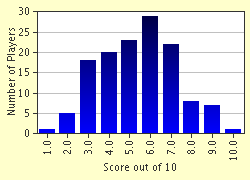Quiz Answer Key and Fun Facts
1. "Good friend for Jesus' sake forbear
To dig the dust enclosed here;
Blest be the man that spares these stones
And curst be that moves my bones".
What is the exact name for an "inscription in verse or in prose specifically upon a tomb"?
2. "Beauty that shall ever be,
Ever to lure thee onward".
What is the exact term for "a verse in which the last word of the line is repeated as the first word of the next line"?
3. "I told you that if you don't change your ways....where will you end up"?
What is the name for this apparent inconsistency in syntactic structure, which at times has been used by orators for special effect?
4. "This royal throne of kings, this sceptred isle,
This earth of majesty, this seat of Mars,
This other Eden, demi-paradise,
This fortress built by Nation for herself..
This blessed plot, this earth, this realm, this England."
What is the correct name for this repetition of the same word(s) at the beginning of successive clauses,sentences or lines?
5. "In sounds guttural, They mutter all". Which of these terms correctly describes a rhyme in which one of the two rhyming elements is actually two words?
6. What is the name for a "humorous pseudo-biographical quatrain, rhymed as two couplets, with lines of uneven length more or less in the rhythm of prose", as illustrated by this short poem:
"Sir Humphrey Davy
Abominated gravy.
He lived in the odium
Of having discovered sodium."
7. "My first is a Tartar; (Turk)
My second is a letter; (E )
My all is a country; (Turkey)
No Christmas dish better"
What is the name of this type of riddle in which each of the various syllables of a word are suggested before you are given a paraphrasis of the word that must be guessed?
8. "When is coffee like soil? When it is ground".
What is the name for a riddle whose answer is or involves a pun?
9. What is the correct term for the re-ordering of the letters of a word into a new word?
10. "I do not know where family doctors acquired illegibly perplexing handwriting".
What is the name for a sentence in which each successive word has one more letter (or syllable) than the preceding?
Source: Author
flem-ish
This quiz was reviewed by FunTrivia editor
MotherGoose before going online.
Any errors found in FunTrivia content are routinely corrected through our feedback system.


